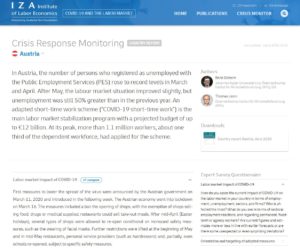While the unprecedented COVID-19 pandemic severely affects societies, economies and labor markets, the impact differs across countries, socio-economic groups and sectors within in countries. For the IZA Crisis Response Monitoring, IZA invited selected labor economists as country experts to jointly monitor the labor market and social policy responses that have been deployed to help mitigate the imminent crisis effects.
Policy inventories released by the OECD and other institutions show significant cross-country differences in policy responses. The IZA initiative aims at providing an independent assessment of actual crisis-related policy responses, based on a qualitative survey among the country experts. Consisting of a set of eight questions, the second wave of the survey covers a sample of 13 European and G7 countries heavily affected by COVID-19.
Second report available online
 The second crisis management report is now available on IZA’s “COVID-19 and the Labor Market” website. The crisis monitoring page contains all country reports in an interactive format that makes for easy comparison (see screenshot), as well as PDF downloads including a summary of the most striking similarities and differences between countries.
The second crisis management report is now available on IZA’s “COVID-19 and the Labor Market” website. The crisis monitoring page contains all country reports in an interactive format that makes for easy comparison (see screenshot), as well as PDF downloads including a summary of the most striking similarities and differences between countries.
While labor markets continue to be heavily affected by the pandemic, countries have started to extend and adjust stabilization measures that were introduced at the outset of the crisis. In an overview, IZA researchers Werner Eichhorst, Paul Marx and Ulf Rinne address three essential elements of the crisis response that require particular attention: the further development of short-time work schemes, ad hoc income protection for the self-employed, and the specific difficulties labor markets are currently facing.
+++
Read also interviews with our country experts from Sweden, Austria, The Netherlands, and Canada.
